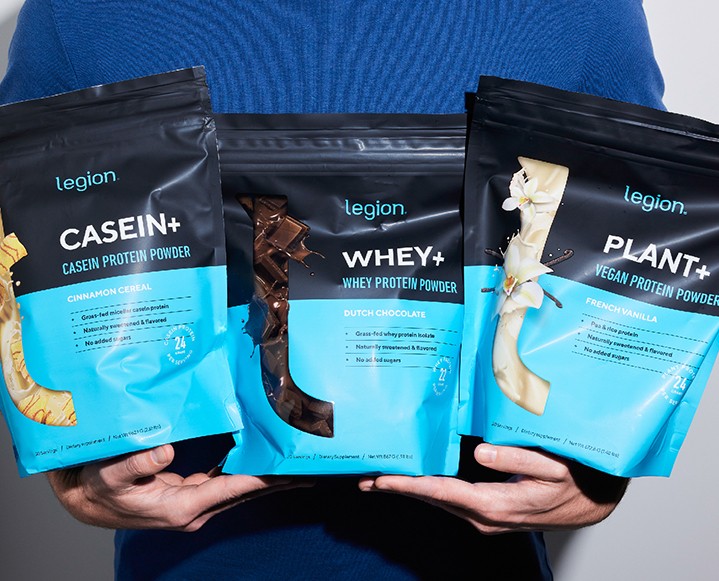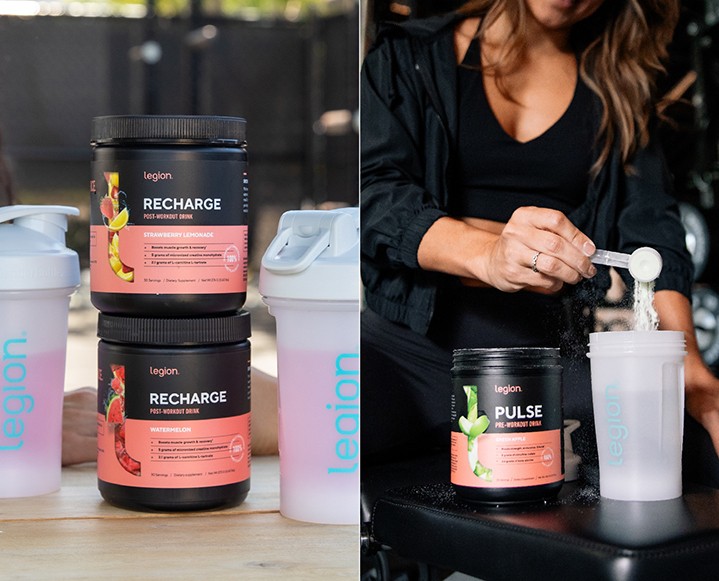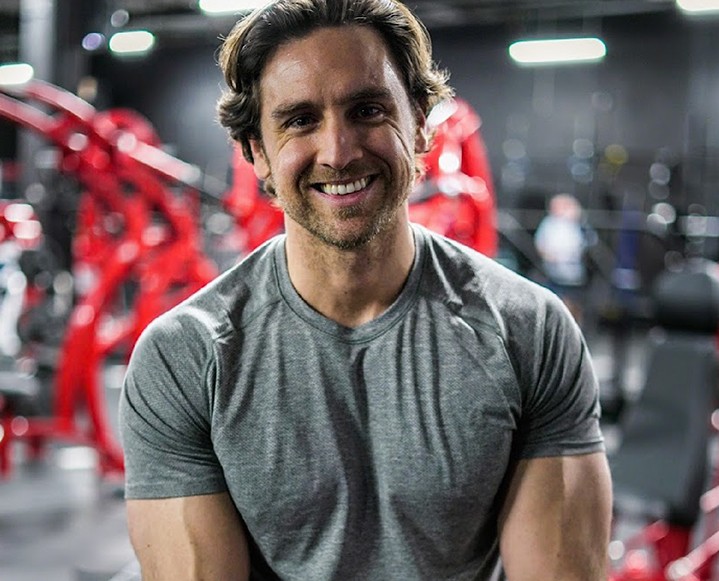
IT'S OFFICIAL: "no pain, no gain" is out of style in the fitness space. While pushing one's self to the point of muscular oblivion was thought to be the only way to see physical results in the 90s and early 2000s, modern-day fitness experts and mainstream wellness gurus have turned their backs on the idea that self-destruction is synonymous with self-actualization. Phew!
Instead, there's been a movement toward prioritizing one's post-recovery routine at the same level as their fitness regimen. With a surge of at-home recovery modalities like red light therapy, PEMF, cold plunges, and infrared saunas, we're fully on board with active rest days. Yes, that means you can nix the idea of "no days off."
Michael Matthews—certified personal trainer, author, and founder of Legion Athletics—educated us about the importance of post-workout recovery, how to better implement a functional routine into our everyday lives, and supportive supplements to optimize our #GainsWithoutPains along the way.
The Importance Of Post-Workout Recovery With Legion Athletic's Michael Matthews
THE IMPORTANCE OF POST-FITNESS RECOVERY: Recovery is a vital part of a fitness routine because it’s during this time that your muscles become bigger and stronger. That is, your muscles only gain size and strength when your body repairs the damage your workouts cause.
In other words, recovery isn't just a break from the gym—it's an essential part of muscle growth.
biggest mistake people make as it relates to recovery: The three biggest mistakes people make when it comes to recovery are eating too few calories, too little protein, and getting inadequate sleep.
Often, discussions about calories focus on fat loss. What many don’t realize, however, is that muscle repair and growth are energy-hungry processes. If you don't fuel your body adequately, it won't have the resources required to recover properly after a workout.
You also need to eat plenty of protein. Protein provides the “building blocks” of muscle, so it’s essential for repairing the damage caused by weightlifting.
Sleep is another critical factor often overlooked. A significant portion of recovery and growth occurs during sleep, which is why getting 7-to-9 hours of sleep each night is necessary to optimize recovery.

HOW DOES MUSCLE-BUILDING WORK? At a cellular level, your body is always busy fixing itself. It rebuilds old, worn-out muscle cells with new, strong ones through a process called muscle protein synthesis. Usually, muscle tissue is fairly stable—the cycle of cellular degradation and regeneration remains balanced, so you don’t lose or gain muscle at an accelerated rate. But when you challenge your muscles with weightlifting or other strenuous exercise, you create a need for more repairs than usual.
In response, your body ramps up protein synthesis. This not only fixes the damage but makes your muscles bigger, stronger, and more capable of handling the stress that caused the damage in the first place. It's like upgrading your body's machinery to be more efficient and powerful.
essential components to a well-balanced workout regimen: It depends on your circumstances and goals. That said, a mix of strength training and cardio is a solid approach for most.
When it comes to weightlifting...
+ Aim to do 3-to-5 weightlifting workouts per week, training all your major muscle groups once every 5-to-7 days.
+ Do 9-to-15 sets per workout with weights that allow you to complete 4-to-10 reps per set and rest 2-to-4 minutes between sets.
For cardio...
+ Do 1-to-3 hours of low-to-moderate-intensity training each week.
+ The key is to pick an activity you enjoy. For many, walking works well, though gentle cycling, rowing, and swimming are worthy alternatives.
top nutrients that people should be getting FOR RECOVERY: A solid recovery routine should include protein, creatine, and fish oil.
01 | Protein provides your body with the “raw materials” it needs to repair and build muscle, which is why eating plenty of protein is essential for post-workout recovery.
02 | Creatine is a natural compound made up of the amino acids L-arginine, glycine, and methionine. Research repeatedly shows that creatine is a safe compound that greatly enhances your body’s ability to bounce back from training.
03 | Fish oil is a boon for recovery. It provides your body with two omega-3 fatty acids (EPA and DHA) that most people don’t get enough of through their diets. These fatty acids benefit recovery by reducing inflammation caused by exercise and other life stressors, and positively influencing the processes that lead to muscle growth.

PROTEIN'S ROLE IN MUSCLE SYNTHESIS: For protein synthesis to occur, you need two main things: a trigger for growth and the raw materials to grow. Most people think weightlifting is the trigger, and eating protein provides the materials. But protein actually does both jobs.
In fact, protein is so capable of kickstarting the muscle-building process that simply eating more protein can lead to muscle gain, even if you don’t lift weights.
Protein also plays a key role in preventing muscle breakdown, which is why eating protein around your workouts (before, after, or both) is such a common recommendation. Doing so not only amps up the muscle-building effects of your workout but minimizes the breakdown of muscle that occurs as a result of weightlifting.
In other words, protein is paramount for the muscle-building process: it provides the raw materials for repair and growth, stimulates muscle protein synthesis, and protects against muscle protein breakdown.
TIPS TO optimize post-workout recovery? Nailing post-workout recovery starts with following a well-designed training program. Specifically, look for one that includes enough volume (how much work you do) and intensity (how hard the exercises are) to spur growth but not so much that you run yourself ragged.
Steer clear of programs that include more than 3-to-5 strength training workouts per week, too. While the "no days off" training mantra might sound motivating, it’s actually a recipe for overtraining and exhaustion.
Next, make sure you consume enough calories and carbs to support your goals, eat around one gram of protein per pound of body weight per day, and sleep 7-to-9 hours per night.
On top of these basics, some supplements can help enhance your recovery. The ones that make the biggest difference are protein powder (if you struggle to hit your daily protein goals), fish oil, creatine, L-carnitine L-tartrate, and corosolic acid.
Beyond that, do whatever makes you feel recovered. For some, that means taking a hot bath; for others, it involves stretching or foam rolling. Research on these practices is patchy—in some studies, they’re beneficial, and in others, they’re benign. So, if they make you feel better, do them; if they don’t, skip them.

YOUR DAILY RECOVERY ROUTINE: While there's a lot of buzz around trendy recovery protocols like light therapy, cold plunges, and saunas, I stick to a straightforward routine. I wake up early after 7-to-9 hours of sleep, eat protein before 9 a.m., then again at lunch, before my afternoon workout, and at dinner. Then, I make time to unwind in the evening by reading a book or spending time with my family before heading to bed.
I don't overload my week with workouts, either. In addition to three weekly weightlifting sessions, I do 1-to-2 hours of low-to-moderate-intensity cardio on a recumbent bike and walk 8,000-to-10,000 steps daily. This gives me plenty of time to recover between workouts.
When it comes to supplements, I use a selection of Legion products that support my overall health and recovery: Whey+, Plant+, and Legion protein bars for protein, Recharge for post-workout recovery, Fortify for joint health, Triton for omega-3s, Triumph as a multivitamin to cover any dietary gaps, and Lunar to help improve sleep quality.
TOP SUPPLEMENTS FOR POST-WORKOUT RECOVERY: For a top-tier post-workout supplement regime, take protein powder, creatine, L-carnitine L-tartrate, corosolic acid, and fish oil. Recovery is really about executing the “boring,” fundamental stuff well—if you’re getting sufficient, high-quality sleep, eating enough calories and protein, and managing your stress levels, everything else is going to provide marginal gains. Take supplements: while you don’t need supplements to recover faster from your workouts, the right ones can help you bounce back a bit faster and stronger.
+ Protein provides your body with the building blocks needed to repair and build muscle. Creatine greatly reduces muscle damage and soreness from exercise. Similarly, L-carnitine L-tartrate lessens muscle damage and soreness from training and boosts muscle repair.
+ Corosolic acid improves blood sugar control and improves how your body uses insulin, making it easier for your muscles to absorb nutrients after exercising.
+ Fish oil reduces the inflammation and muscle damage caused by exercise, thereby reducing soreness. It also boosts immune function after a workout, which can dip after exercise, leaving you susceptible to sickness. Additionally, fish oil may protect motor neurons after prolonged physical exercise, which can preserve strength and range of motion after training.
how does recharge enhance someone's post-workout? Recharge is our natural post-workout supplement that contains clinically effective doses of scientifically proven ingredients to help you train harder, gain more muscle and strength, recover better, and experience less soreness.
Unlike most post-workout supplements, Recharge is supported by 44 peer-reviewed scientific studies, which show its combination of ingredients and doses are effective and safe.
It also contains no artificial sweeteners, flavors, food dyes, or other chemical junk and is analyzed for purity and potency in state-of-the-art labs.
the legion difference: At Legion, we have a simple standard that we live by: Every ingredient we use must be backed by published scientific research that demonstrates clear benefits. Furthermore, we will only use ingredients that we can include at clinically effective doses, which are the exact amounts shown to be safe and effective in scientific studies.
It makes our job harder, and we don’t make nearly as much profit per bottle as our competitors, but it means our products represent a standard by which all others can be judged. And that matters a lot to us.
Recover like a pro with 20% your first Legion Athletics order. Use code TCM at checkout.
All material on The Chalkboard Mag is provided for educational purposes only. Always seek the advice of your physician or another qualified healthcare provider for any questions you have regarding a medical condition, and before undertaking any diet, exercise or other health-related programs.
This story is brought to you in partnership with Legion Athletics. From time to time, TCM editors choose to partner with brands we believe in to bring our readers special offers.
The post We Asked A Fitness Expert His Secrets For Optimizing His Post-Workout Recovery appeared first on The Chalkboard.
from The Chalkboard https://ift.tt/2PCxM0v
via IFTTT

No comments:
Post a Comment